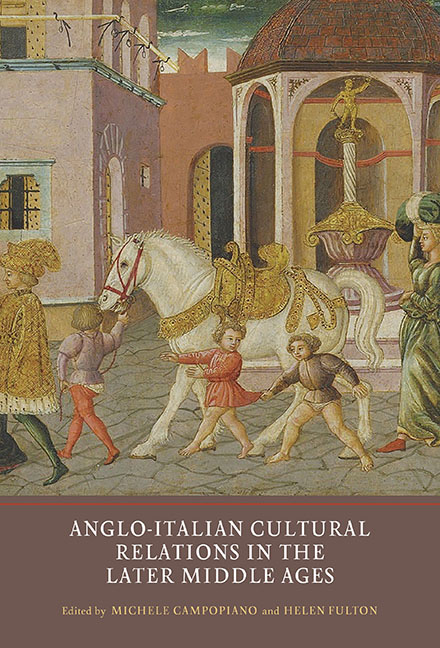Book contents
- Frontmatter
- Contents
- List of Illustrations
- List of Contributors
- Acknowledgements
- List of Abbreviations
- Introduction: Historical and Literary Connections between Britain and Italy in the Middle Ages
- 1 Writing, Translating and Imagining Italy in the Polychronicon
- 2 Richard de Bury, Petrarch and Avignon
- 3 The Reception of Italian Political Theory in Northern England: Bartolus of Saxoferrato and Giles of Rome in York
- 4 Italian Firms in Late Medieval England and their Bankruptcy: Re-reading an Old History of Financial Crisis
- 5 ‘Nostri Fratelli da Londra’: The Lucchese Community in Late Medieval England
- 6 ‘Saluti da Londra’: Italian Merchants in the City of London in the Late Fourteenth and Early Fifteenth Centuries
- 7 Political Joachism and the English Franciscans: The Rumour of Richard II's Return
- 8 Urban History in Medieval and Early Modern Britain: The Influence of Classical and Italian Models
- Afterword: The Nature of Anglo-Italian Cultural Exchanges
- Bibliography
- Index
4 - Italian Firms in Late Medieval England and their Bankruptcy: Re-reading an Old History of Financial Crisis
Published online by Cambridge University Press: 03 July 2019
- Frontmatter
- Contents
- List of Illustrations
- List of Contributors
- Acknowledgements
- List of Abbreviations
- Introduction: Historical and Literary Connections between Britain and Italy in the Middle Ages
- 1 Writing, Translating and Imagining Italy in the Polychronicon
- 2 Richard de Bury, Petrarch and Avignon
- 3 The Reception of Italian Political Theory in Northern England: Bartolus of Saxoferrato and Giles of Rome in York
- 4 Italian Firms in Late Medieval England and their Bankruptcy: Re-reading an Old History of Financial Crisis
- 5 ‘Nostri Fratelli da Londra’: The Lucchese Community in Late Medieval England
- 6 ‘Saluti da Londra’: Italian Merchants in the City of London in the Late Fourteenth and Early Fifteenth Centuries
- 7 Political Joachism and the English Franciscans: The Rumour of Richard II's Return
- 8 Urban History in Medieval and Early Modern Britain: The Influence of Classical and Italian Models
- Afterword: The Nature of Anglo-Italian Cultural Exchanges
- Bibliography
- Index
Summary
Recent financial crises, from 2007 onwards, have attracted renewed interest in a topic that had been neglected for decades, particularly in continental, but also in English-language historiography: that of the big merchant-banking companies of the late Middle Ages and the financial crises they suffered from the late thirteenth century. The eruption of the sub-prime mortgage crisis in the United States and the collapse of Lehman Brothers in 2008 have generated a number of articles stressing the cyclical recurrence of financial crisis in capitalistic systems or protocapitalistic ones. Taking a long historical perspective, some of the most famous bankruptcies are those of the Florentine companies in 1344–6 and those of the Genoese bankers lending to Spanish monarchs in the late sixteenth to early seventeenth centuries. But it could be claimed that the first international financial crisis actually occurred in the 1290s, due to the collapse of the Ricciardi (or Riccardi) company from Lucca, who had been for two decades Edward I's loyal bankers before entering a period of severe troubles which ultimately led to their failure in 1300.
The vicissitudes of the Ricciardi company in England and the role of Italian bankers more generally were thoroughly investigated in a series of studies published during the last decades of the twentieth century. Following something of a historiographical vacuum around the topic, a research project by the International Capital Markets Association (ICMA) based at the University of Reading, entitled ‘Credit Finance in the Middle Ages: Loans to the English Crown c. 1272–1340’, returned to the subject, producing a number of studies and analyses of sources concerning the royal accounts (particularly the valuable Exchequer and Wardrobe accounts). The focus of this project is on the English monastic wool market and the system of forward contracts set up by the Italian firms, on the interest rate applied in various kind of loans, and on the vicissitudes of the principal Italian banking companies acting in England as bankers to the Crown in the period of the three Edwards – namely the Ricciardi, the Frescobaldi and the Peruzzi, Bardi and Acciaiuoli – and the reasons leading to their collapse. The wider aim is ‘to apply modern economic and financial analysis to medieval sources’, as stated in the presentation of the project background.
- Type
- Chapter
- Information
- Publisher: Boydell & BrewerPrint publication year: 2018

